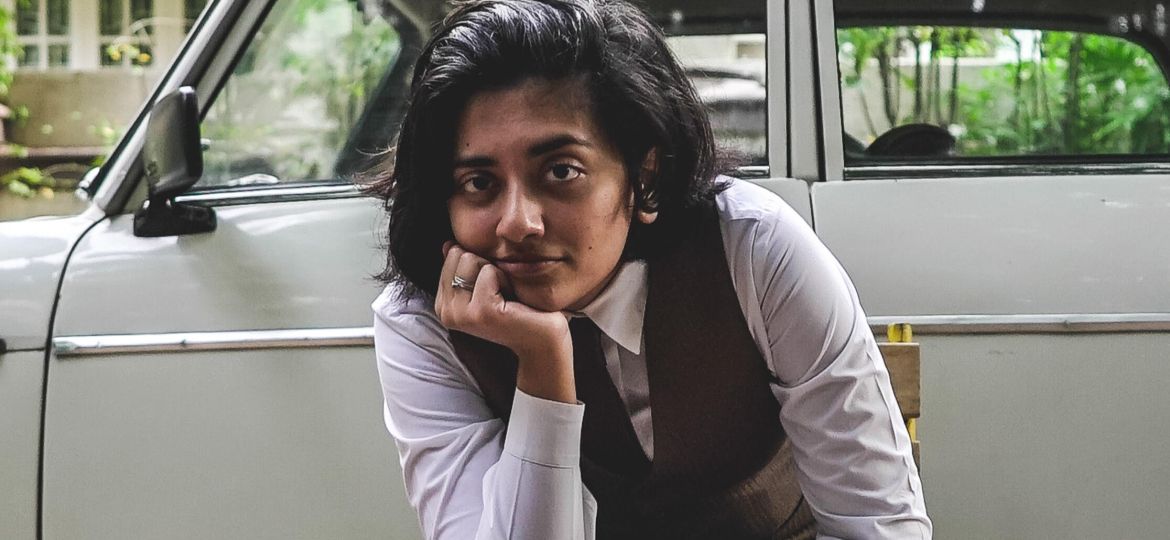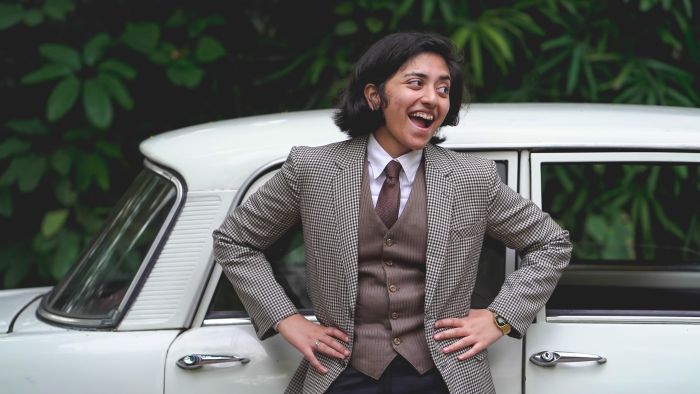
Prarthana Prasad better known by many as Short Haired Brown Queer, is “making the gay Indian content that I want to see”. Prarthana is a social media Content Creator and winner of the Editor’s Panel 2023 Cosmopolitan LGBTQIA+ Voice of the Year. She focuses on the desi LGBTQIA+ experience, challenging gender norms and integrating aspects familiar to the community specifically in the Indian context.

Shikha Aleya (SA): Prarthana hi, and a warm thank you for this interview, the first of 2024 at In Plainspeak! As January unfolded, you put up a post on Instagram here, where you wrote of “little bits of unexpected queer representation” and that, “It’s like these spaces know me and respect me and care for me”. So here’s the first question directly on the theme of this issue, Entertainment and Sexuality: Do you feel that the potential for respect and caring in our entertainment spaces, for inclusion of diverse identities, is increasing? What do you see and experience of this around you?
Prarthana Prasad (PP): I do think the potential for respect and caring in our entertainment space is increasing, but I also think a lot of it is superficial. It’s hard to shake the fact that the entertainment industry and all that it does exist to be seen. So most of what they do in terms of LGBTQIAP+ inclusion also merely exists to be seen; seen in the way of making an impression, as seen to be woke, or politically correct, to join the trend.
I do feel like there is a new normal where a lot of OTT (over-the-top / streaming platforms) shows have a token queer character now or a small queer storyline on the sideline. What matters is how much these stories or characters actually impact the audience that watches them. Movies like Kaathal – The Core, starring Mammootty, were truly bringing the unique experiences of queer and Indian individuals to the screen. That’s what matters. It’s not just about including a queer character in your story to ensure you’re ‘uncancellable’ on social media.
We need to include real queer folks in the writing, acting and directing of these stories. We need to give them a safe space to express themselves on and off the screen within the industry. That’s the only way to combat skin-deep inclusion. But there is much more positive representation to look at now in the Indian entertainment space than there ever was before and that’s a truly wonderful thing to applaud and appreciate. But I have to continue to ask for more.
SA: In an episode of the podcast, Rainbow Diaries, you spoke of school and growing up, referring to being the “weird kid in class”, who “would rather be kissing a girl than kissing a boy”, and “falling in love with my best friend”. Further ahead in the same conversation you have given an approach to understanding bullying, saying, “common bullying would be mental”. How do your experiences growing up make you the entertainer that you are, someone who is funny, satirical, drives home some serious points? Give us your take on you!
PP: I firmly believe humour is the best defence mechanism. It’s the only tool that allows you to acknowledge the difficult things happening to you or around you without letting it destroy you. Since the age of 14, I knew I was lesbian. Growing up queer in a society like ours can only be described as lonely. It’s incredibly isolating and painful and does no good at all to your hopes for the future or your mental health.
In trying to rationalise how people could hate me just for being gay, how this thing that felt so natural to me could be so against what society expects of me, I realised that most rules that society has for us are completely irrational. It’s always better to make your own choices than to blindly listen to what someone else tells you, no matter who that someone else is.
This led to me being a very no-nonsense person. No one really dared speak ill to me because I would have a far more cutting response to shut them off. That cutting sarcasm softened as I got older (and less angry at the world). It went from mean funny to just funny funny. And I think humour is an amazing way to get even the most prickly audience to listen to you a little bit.
But despite this long drawn out explanation about why I’m funny, I fully maintain that I became funny just to get my pretty girl crush to laugh and smile.
SA: So, continuing with that thread, what are the insights you have gained from your audiences, on issues of inclusion across multiple intersections of identity, that include race, gender, sexual orientation, disability, age, and other dimensions?
PP: I think it takes mindful effort to create a truly inclusive dialogue. Even within the LGBTQIAP+ community, it’s far too easy to end up not being inclusive of the entire community. You crack a joke about being lesbian and thanking god you never have to date a man and you end up excluding your bisexual audience.
I’ve personally thought a lot about how I can hit that sweet spot of creating something that’s relatable and funny without hurting or outright excluding the people around me. I’m a cisgender woman so there’s a lot of transgender experiences that I can’t speak to. But I try my best to keep educating myself and sharing the voices of other amazing people and their experiences. I’m from a certain social background and the privilege of that is what partly allows me to have a voice. But I use my voice for creating genuine visibility and awareness. I’m not prioritising money or brands.
I’ve personally learnt just how vast our community is. I’m sure I’ve spoken to people from every Indian state and city across rural and urban backgrounds. I’ve spoken to 13-year-olds and 50-year-olds who are both struggling with the same problems. How do they truly know their identity, how do they tell the people around them and how will these people react? There is a lot that binds us together and so much that makes each of us unique.
When you’re from the LGBTQIAP+ community, it doesn’t automatically make you a person who’s inclusive and mindful and informed. But you do have the unique opportunity to learn that empathy for yourself and the people around you. Unless you are truly accepting of the people around, you can’t expect that acceptance for yourself.
SA: You’ve said some really powerful things here Prarthana, and managed to keep it simple and close to home. Perhaps it is necessary at this point to take a step back and ask, what is entertainment? What entertains, and whom does it entertain? Why do we need to consider what is entertaining and what is harmful, particularly in light of recent discussions around misogyny and regressive portrayals of gender, sexuality and relationships in films for example?
PP: I have to take you back to my previous answer. “that sweet spot of creating something that’s relatable and funny without hurting or outright excluding the people around me”.
It’s easy to be a comedian who makes jokes that punch down on minority communities that you don’t understand. It’s easy to get your movie popular because you made it so grotesquely violent that there’s a certain perverse curiosity in watching it. It’s easy to create whatever you want and wash your hands of the impact it’ll have on the people who consume it because it’s your ‘artistic license’
It’s easy and more importantly, it’s garbage.
As a creator, comedian, actor, musician, director, you are completely responsible for what you put out there. There is no artistic value in glorifying hatred towards women or any community. Portray that hatred if you must, and assume responsibility for it. If you portray a man hitting a woman and glorify that man for it, some of the men watching your movie will go home and be physically abusive towards the women around them.
The sad reality is that most of our moral compass comes from the society around us. And our entertainment is a massive part of that society. Social Media might very well be the new religion. There is no point in saying that entertainment and society are separate. It’s simply not true. Entertainment should aim to inspire, comfort, reflect and express. Just because something grotesque and violent earns big at the box office, it doesn’t justify its creation. Money is not the needle in the moral compass.
SA: Yes, to all that you’re saying here, and thank you for saying it! A last question. TARSHI has been engaging in an ongoing process of supporting the creation of Safe, Inclusive and Self-affirming, SISA, spaces across environments. This article based on an interview with you mentions that “for many people coming out can be a life-and-death sort of situation if they do not receive the love and support of their loved ones”. Please share what to watch out for when coming out publicly, and how to take care of yourself when doing so.
PP: There are four requirements that should ideally be fulfilled before you come out. Firstly, you need to be able to ensure your physical safety. Would you be able to leave your home and find another place to stay if you needed to? Secondly, are you financially independent? Would you be able to support yourself financially if your family cut you off? Thirdly, do you have a support system? Are there other family members, friends, a community or an organisation that you can reach out to if you need a listening ear or any other help? And fourthly, are you mentally ready for this step?
It seems like a lot to consider. I believe I had supportive family members outside of my parents that made it easier to come out to my parents. I also had fair reason to know that my parents would not be physically abusive or threatening. I was mentally ready for anything because I already felt like I was at rock bottom in terms of my mental health and my relationship with my parents.
There is never any compulsion or requirement that you have to come out. There is no right time or place or age to do it. Your safety should always be your priority. But if you have the ability to come out and be visible, do it. You will never be satisfied living a life where you’re hiding your true self. There is never much joy in such a life. No matter what the people around you say when you come out to them, just know that you are in the right and they are clouded by ignorance and fear. If they do not accept you now, just know that they will in the future. If they never come to terms with accepting you, they were never destined to be in your life.
That is how you take care of yourself, by prioritising yourself. And remember that you are never alone. There are millions if not billions of other people who have struggled with these same issues and come out strong and happy on the other side. Just give it time and keep your belief.
Photos: Courtesy of Prarthana Prasad.